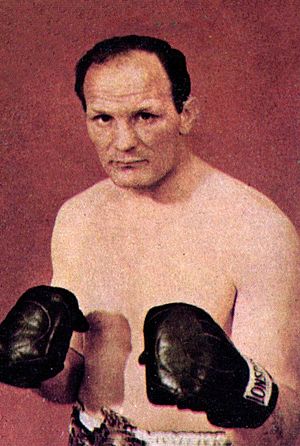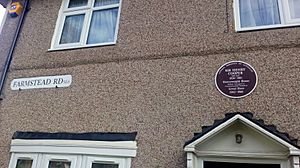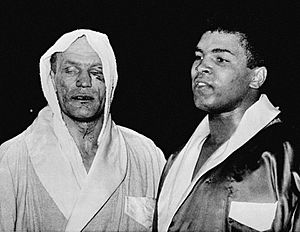Henry Cooper facts for kids
Quick facts for kids Sir Henry CooperOBE KSG |
|||||||||||||||||
|---|---|---|---|---|---|---|---|---|---|---|---|---|---|---|---|---|---|

Cooper around 1969
|
|||||||||||||||||
| Statistics | |||||||||||||||||
| Real name | Henry Cooper | ||||||||||||||||
| Nickname(s) | Our 'Enry | ||||||||||||||||
| Rated at | Heavyweight | ||||||||||||||||
| Height | 6 ft 1+1/2 in | ||||||||||||||||
| Reach | 75 in | ||||||||||||||||
| Nationality | English | ||||||||||||||||
| Born | 3 May 1934 Lambeth, London, England |
||||||||||||||||
| Died | 1 May 2011 (aged 76) Limpsfield, Surrey, England |
||||||||||||||||
| Stance | Orthodox | ||||||||||||||||
| Boxing record | |||||||||||||||||
| Total fights | 55 | ||||||||||||||||
| Wins | 40 | ||||||||||||||||
| Wins by KO | 27 | ||||||||||||||||
| Losses | 14 | ||||||||||||||||
| Draws | 1 | ||||||||||||||||
|
Medal record
|
|||||||||||||||||
Sir Henry Cooper (3 May 1934 – 1 May 2011) was a famous British heavyweight boxer. Many remember him for a fight in 1963 where he knocked down a young Cassius Clay. The fight was stopped because Cooper got a cut above his eye from Clay's punches.
Cooper was a champion in Britain and the Commonwealth for twelve years. He also held the European heavyweight title for three years. In 1966, he fought Ali again, who was then the world heavyweight champion. Cooper lost again due to an eye injury. Henry was voted BBC Sports Personality of the Year twice. After he retired in 1971, he remained a popular public figure. He is the only boxer in the UK to have been given a special honour called a knighthood.
Contents
Early Life and Boxing Start
Henry Cooper was born on May 3, 1934, in Lambeth, London. His parents were Henry and Lily Cooper. He had an identical twin brother named George and an older brother named Bern. They grew up in a council house in South East London. During World War II, the family was sent away for safety to Lancing on the Sussex coast.
Life was hard during the war. Henry took on many jobs, like delivering newspapers before school. He also made money by finding and selling golf balls. All three Cooper brothers were good at sports, especially football and cricket. Henry started boxing in 1949 as an amateur. He joined the Bellingham Boxing Club and won 73 out of 84 fights. When he was 17, he won two amateur light-heavyweight titles. After this, he joined the Royal Army Ordnance Corps for National Service.
Henry Cooper at the 1952 Olympics
Cooper represented Great Britain as a light-heavyweight boxer at the 1952 Olympics in Helsinki, Finland. He had a bye in the first round. In the next round, he lost to Anatoly Perov from the Soviet Union.
Professional Boxing Career
Henry Cooper's Boxing Style
Henry Cooper was naturally left-handed. However, he fought in the "orthodox" style. This means he put his strongest (left) hand and foot forward. This allowed him to hit opponents hardest with his front hand. His famous left hook, known as "Enry's 'Ammer," often moved upwards like an uppercut. He also had a strong left jab.
Cooper was known for getting cuts easily around his eyes. He wasn't the best at defending himself. But he made up for it by always attacking in his fights. Later in his career, he developed a problem with his left shoulder. He then focused more on using his right-handed punches.
Early Fights and Challenges
Henry and his twin brother, George (who boxed as Jim), both became professional boxers. Their manager was Jim Wicks. Wicks was known for protecting his boxers and not letting them fight opponents who were too tough too soon. However, Cooper often got cuts, and it took him a while to reach his full potential.
He lost some early title fights. He lost to Joe Bygraves for the Commonwealth belt and to Ingemar Johansson for the European belt. He also lost to the skilled Welsh boxer Joe Erskine for the British and Commonwealth titles. Cooper then had an impressive win against American heavyweight Zora Folley. But he later lost to Folley in a rematch.
Becoming British and Commonwealth Champion
The year 1959 was a great one for Henry Cooper. He won the British and Commonwealth titles from Brian London after 15 rounds. He also received a special 9-carat gold Lonsdale Belt. He kept these titles by successfully defending them against boxers like Dick Richardson, Joe Erskine (twice), and Johnny Prescott. Another win against Brian London led to an offer to fight Floyd Patterson for the world heavyweight title. However, Cooper or his manager turned down this fight.
Fights Against Muhammad Ali
In 1963, Muhammad Ali (then known as Cassius Clay) came to London for a fight with Cooper. Ali was a rising star and talked a lot before his fights. Many British fans hoped Cooper could beat the confident young American. Most boxing experts, however, thought Ali would become a world champion and that Cooper was the underdog.
The fight happened at Wembley Stadium. Ali was much heavier than Cooper. Cooper had trained very hard and felt he was in the best shape of his life. Ali was fast and hard to hit. Cooper was accused by Ali's team of hitting after the referee told them to stop.
Cooper was ahead on points. In the last seconds of the fourth round, Cooper hit Ali with his famous left hook, "Enry's 'Ammer." Ali fell to the canvas. He got up at the count of three but seemed dazed. There was a short delay before the next round. Cooper believed this delay was longer than it should have been and stopped him from finishing Ali off.
In the fifth round, Ali came out aggressively. He opened a bad cut under Cooper's eye. Ali hit Cooper with many hard punches, and Cooper's corner threw in the towel. The referee stopped the fight, and Ali won by technical knockout.
After this fight, it became a rule that a spare pair of gloves must always be at ringside. In 1966, Cooper fought Ali again for the heavyweight championship. This time, Ali was more careful and held Cooper tightly during clinches. Cooper had scar tissue around his eyes, which made him more likely to get cut. Ali opened a serious cut, and the fight was stopped again. Cooper lost to Ali by technical knockout once more.
Later Fights and Retirement
After losing to former world champion Floyd Patterson in 1966, Cooper remained undefeated until his very last fight. He successfully defended his British and Commonwealth titles against boxers like Jack Bodell and Billy Walker. This made Cooper the only boxer to win three Lonsdale Belts. In 1968, he won the European title from Karl Mildenberger and defended it twice.
In May 1971, a 36-year-old Cooper fought 21-year-old Joe Bugner. Bugner was one of the biggest heavyweights in the world. The fight was for the British, European, and Commonwealth titles. The referee awarded the fight to Bugner by a very small margin. The crowd, mostly Cooper fans, booed the decision. Cooper announced his retirement soon after. Cooper did not speak to the referee for many years, but they eventually shook hands at a charity event.
Henry Cooper's Thoughts on Modern Boxing
In his later years, Cooper stopped commenting on boxing. He felt "disappointed with boxing" because he preferred the "straight, hard and fast boxing" he knew from his own time. He believed that modern heavyweights were too big and made fights less exciting. In his final year, he said that boxing was "not as good as it was." He named Joe Calzaghe, Ricky Hatton, and Amir Khan as "the best of their era." However, he thought they would not be as good as champions from 30 or 40 years ago.
Life Outside Boxing
In the 1960s, Henry Cooper appeared in public safety films about road safety. He encouraged people to use zebra crossings. After retiring from boxing, he stayed famous. He appeared on the BBC quiz show A Question of Sport and in many advertisements, especially for Brut aftershave. He was also a frequent guest speaker at charity events. He played a boxer named John Gully in the 1975 film Royal Flash. In his later years, he appeared in public service announcements. These urged people to get vaccinated against influenza.
Cooper had invested money at Lloyd's of London. This was thought to be a safe investment. But in the 1990s, he lost a lot of money. He even had to sell his Lonsdale belts. After this, Cooper earned money by speaking at dinners and events. He seemed happy, though he became quieter after his wife's sudden death at age 71.
Considering his long boxing career, Cooper had few health problems from boxing. He had "a bit of arthritis" but remained a strong figure. He lived in Hildenborough, Kent, and was the president of Nizels Golf Club.
Cooper was married to Albina Genepri from 1960 until her death in 2008. He converted to her Catholic faith. He described Albina, who "hated" boxing, as "an ideal wife for a boxer." She never complained about his long absences before big fights. She also invited journalists in for tea while they waited for Cooper to wake up after fights. He was survived by their sons and two grandchildren.
Awards and Honours
Henry Cooper was the first person to win the BBC Sports Personality of the Year award twice. He won in 1967 for being unbeaten and again in 1970. By 1970, Cooper was the British, Commonwealth, and European heavyweight champion. He is the only British boxer to win three Lonsdale Belts completely.
Cooper was given the honour of Officer of the Order of the British Empire (OBE) in 1969. He received a special honour from the Pope, a Papal Knighthood, in 1978. He was then knighted by the Queen in 2000. He is also celebrated in the "London Song" by Ray Davies on his 1998 album The Storyteller. He was also the subject of the TV show This Is Your Life in 1970.
Professional Boxing Record Summary
| 55 fights | 40 wins | 14 losses |
| By knockout | 25 | 7 |
| By decision | 13 | 6 |
| By disqualification | 2 | 1 |
| Draws | 1 | |
Images for kids
See also
 In Spanish: Henry Cooper para niños
In Spanish: Henry Cooper para niños
 | Aurelia Browder |
 | Nannie Helen Burroughs |
 | Michelle Alexander |




